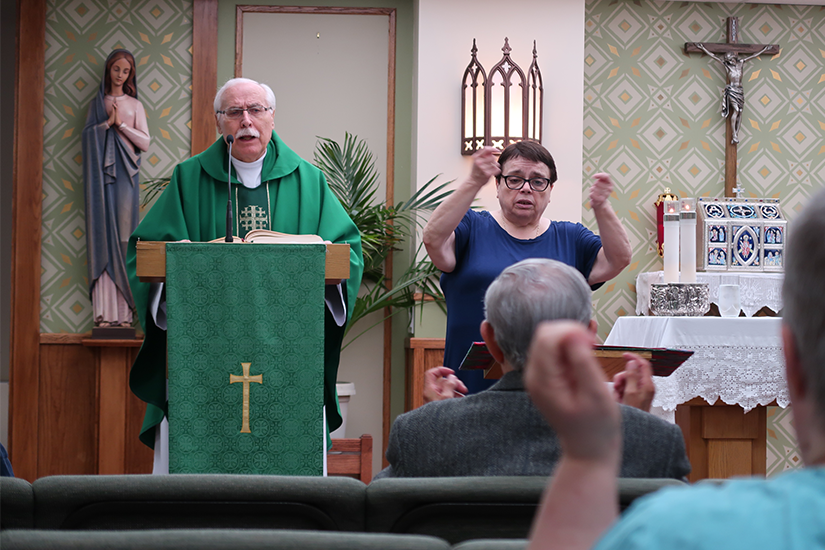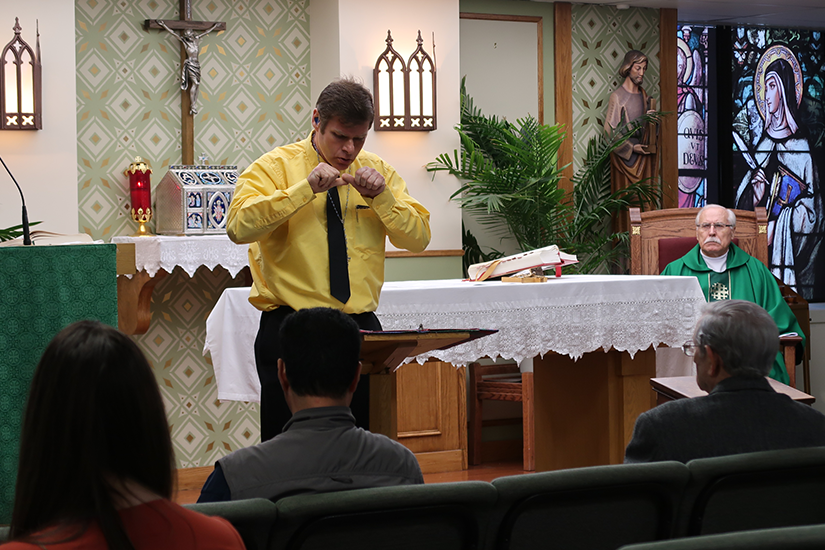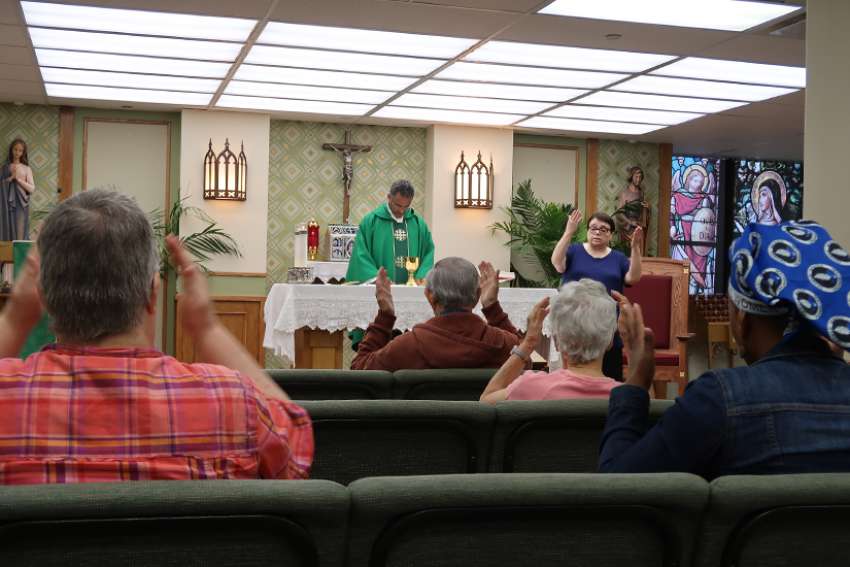He lost his hearing at the age of three but the nuns who taught him at Halifax School for the Deaf insisted that he Mass every Sunday.
“At school, in religion class, they said I have to go, I have to go ... but we just sat there and got absolutely nothing,” he said through a sign language interpreter. “But when I moved to Toronto, the priest could sign and I just went, ‘Oh interesting,’ and I learned more and more about my faith.”
Brockerville, 79, said that as a young boy, he would sit in the pews with his family, reading the missal, but not really feeling like there was a point to it. But after he attended his first signed Mass in 1964, he said it was like having a key that opened up Heaven to him.
He felt welcomed to participate in the congregation and it encouraged him to learn more about his faith. Thirty years later, he entered the permanent diaconate in 1994 in the Archdiocese of Toronto and has become an integral part of the St. Francis de Sales deaf ministry, helping others discover that hearing impairment need not be an obstacle to growing your faith.
On Aug. 25, the ministry is celebrating 100 years of serving the Catholic deaf community in Toronto. A celebration Mass and banquet will take place at St. Michael’s Cathedral at 5 p.m. with Cardinal Thomas Collins.
In 1918, Rev. Mother Mary Columbière of the Loretto Sisters was worried about the Catholic deaf who were her former students.
With the blessing of Archbishop Neil McNeil, she was put in charge of the Religious Services for the Catholic Deaf. Columbière then worked with the Paulist Fathers at St. Peter’s Church near Loretto College to conduct a sermon for the deaf every Sunday afternoon.
St. Francis de Sales (1567-1622) became the name and the patron saint of the ministry in 1924 after Pope Pius XI named him a Doctor of the Church a year before. St. Francis de Sales developed an early form of sign language to communicate with a deaf man and became instrumental in the man’s conversion.
As Loretto College’s student enrolment began to grow, the ministry moved to the Catholic Extension building on Bond Street in 1960. They had to move a few more times until the ministry found a home in Holy Name Parish from 1968 to 2005, where Fr. Gordon Bean signed Sunday Mass for the Catholic deaf. At the height of the ministry, the church welcomed about 250 deaf people in the congregation until 1970.
From 1970 to 1985, the ministry developed various programs for the Catholic deaf, including youth and young adult deaf groups, a Catholic Women’s League chapter for deaf ladies and a seniors’ group. A Rite of Christian Initiation for Deaf Adults (RCIDA) launched in 1992.
The ministry hit another milestone in 1994, welcoming Brockerville as the first deaf deacon to be ordained in the archdiocese. He is the second deaf deacon to be ordained in Canada.
In 1997, numbers began to dwindle as many of the members moved out of Toronto and the ministry no longer had signing priests. Ten years later, the group moved to an office building in Bay Street where they shared the chapel space with St. Stephen’s Chapel.
Brockerville’s story is only one of countless more of those who have rediscovered their faith because of the service provided by generations of signing priests, deacons, religious sisters and lay pastoral workers.
 Carol Stokes signs the Gospel acclamation for Fr. Guenter Petricek at the St. Francis de Sales deaf Mass at St. Stephen’s Chapel in downtown Toronto. (Photo by Jean Ko Din)
Carol Stokes signs the Gospel acclamation for Fr. Guenter Petricek at the St. Francis de Sales deaf Mass at St. Stephen’s Chapel in downtown Toronto. (Photo by Jean Ko Din)
 Jordy Winget, chapter secretary of the International Catholic Deaf Association in Canada, signs one of the readings for the congregation that celebrates Mass weekly at St. Stephen’s. (Photo by Jean Ko Din)
Jordy Winget, chapter secretary of the International Catholic Deaf Association in Canada, signs one of the readings for the congregation that celebrates Mass weekly at St. Stephen’s. (Photo by Jean Ko Din)
Today, the ministry is slowly growing once again, under the leadership of lay co-ordinator and sign language interpreter Carol Stokes. Brockerville serves the spiritual needs of the group.
Every Sunday, Stokes co-ordinates signing interpreters for 9:30 a.m. Mass at St. Maximilian Kolbe Parish in Mississauga, 11 a.m. at St. Stephen’s Chapel in downtown Toronto, 6:15 p.m. at St. Gertrude’s Parish in Oshawa and once a month at Holy Spirit Church in Barrie. She also co-ordinates interpreters for special sacraments for the group, including baptisms and weddings.
On a recent Sunday morning at St. Stephen’s Chapel, the Mass is completely silent except for the voices of Fr. Guenter Petricek, who is celebrating Mass, and Stokes, who is responding to the prayers as she interprets for the deaf congregation.
But where only a few participate in the vocal responses of a regular hearing Mass, every person can be seen signing every prayer as one congregation.
“It’s a picture language, so we have people telling us that it just adds to their celebration because even though they don’t understand sign, they can visibly see the Word of God being expressed,” she said.
Stokes said that all are welcome to attend the deaf Mass, even hearing people. She insists that one doesn’t have to be fluent in American Sign Language to witness how the liturgy comes alive in a signing Mass.
There are about 50 regular members who attend St. Stephen’s every week. They travel from all across the Greater Toronto Area. Some even travel from as far as Oshawa to be a part of the downtown Toronto ministry.
“I really encourage (the members’) involvement because we don’t have a signing priest,” said Stokes.
Because of this, Stokes said there is a greater call for the deaf community to become more involved, becoming altar servers, signing lectors and organizing social time after Mass. It is important, she said, that they have an ownership over their community.
“Some of them are surprised because sometimes when they go to their home churches, there is not any effort to find something for them,” said Stokes. “But when they come, suddenly, they fit right in…. They are feeling so much more a member of the archdiocese.”
The Catholic deaf ministry is a hidden gem in the Canadian Church. The International Catholic Deaf Association (ICDA) in Canada, which holds its 14th annual conference Aug. 22-26 in Toronto, has chapters in five major cities. The Greater Toronto Area expands its chapter to also cover neighbouring cities Mississauga, Barrie and Oshawa.
There are numerous dioceses that run deaf ministries across the country, including Ottawa and Edmonton, where they have signing priests.
ICDA chapter president Alvera Nyabasa was looking for a Catholic deaf community in Toronto for two years before she found St. Francis de Sales’ ministry in 2007.
“I kept looking and looking, where are the Catholic deaf,” said Nyabasa, as interpreted by Stokes. “On the Internet, I found finally, but I was very frustrated for a long time.”
Growing up, Nyabasa went to an international Catholic school for the deaf in Africa where nuns would interpret the Mass for the priests. When she moved to Toronto in 2005, she craved a similar community that she had back home but the ministry was hard to find.
Nyabasa said it was through Stokes and Brockerville that she began to delve deeper into her faith. Stokes taught her how to sign the rosary, and Brockerville is always sharing new teachings of the faith to the group.
“I love it. I feel like they’re all my brothers and sisters,” said ICDA chapter secretary Jordy Winget, as interpreted by Stokes. “I keep learning and improving. I’ve learned a lot from all of them.”


